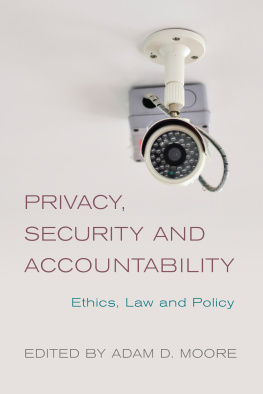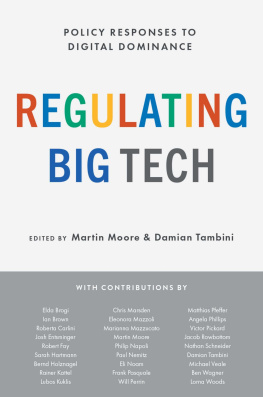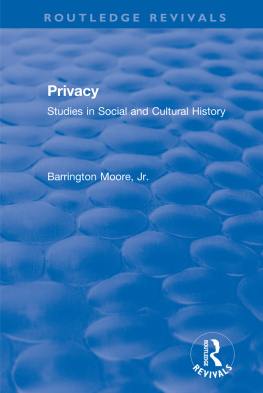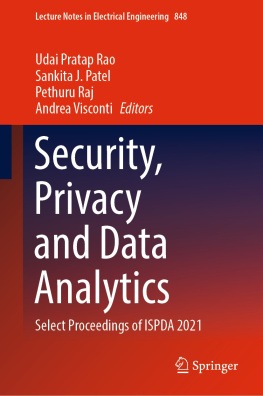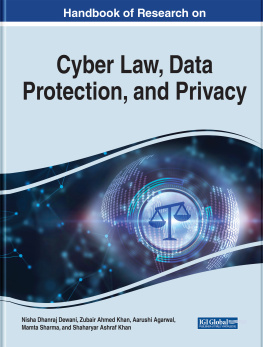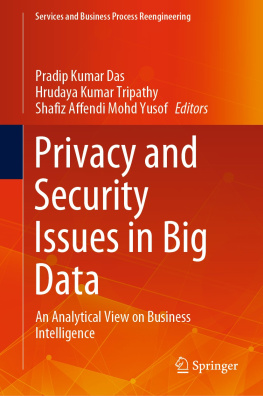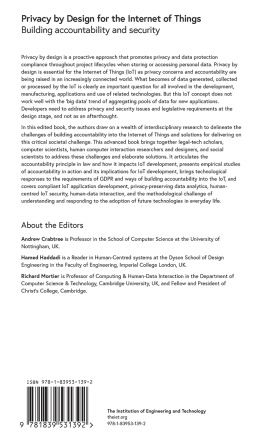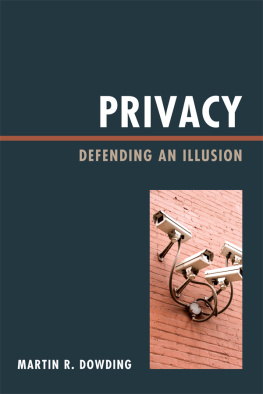Moore Adam D. - Privacy, Security and Accountability: Ethics, Law and Policy
Here you can read online Moore Adam D. - Privacy, Security and Accountability: Ethics, Law and Policy full text of the book (entire story) in english for free. Download pdf and epub, get meaning, cover and reviews about this ebook. year: 2012, publisher: Rowman & Littlefield Publishers, genre: Politics. Description of the work, (preface) as well as reviews are available. Best literature library LitArk.com created for fans of good reading and offers a wide selection of genres:
Romance novel
Science fiction
Adventure
Detective
Science
History
Home and family
Prose
Art
Politics
Computer
Non-fiction
Religion
Business
Children
Humor
Choose a favorite category and find really read worthwhile books. Enjoy immersion in the world of imagination, feel the emotions of the characters or learn something new for yourself, make an fascinating discovery.
- Book:Privacy, Security and Accountability: Ethics, Law and Policy
- Author:
- Publisher:Rowman & Littlefield Publishers
- Genre:
- Year:2012
- Rating:3 / 5
- Favourites:Add to favourites
- Your mark:
- 60
- 1
- 2
- 3
- 4
- 5
Privacy, Security and Accountability: Ethics, Law and Policy: summary, description and annotation
We offer to read an annotation, description, summary or preface (depends on what the author of the book "Privacy, Security and Accountability: Ethics, Law and Policy" wrote himself). If you haven't found the necessary information about the book — write in the comments, we will try to find it.
Moore Adam D.: author's other books
Who wrote Privacy, Security and Accountability: Ethics, Law and Policy? Find out the surname, the name of the author of the book and a list of all author's works by series.
Privacy, Security and Accountability: Ethics, Law and Policy — read online for free the complete book (whole text) full work
Below is the text of the book, divided by pages. System saving the place of the last page read, allows you to conveniently read the book "Privacy, Security and Accountability: Ethics, Law and Policy" online for free, without having to search again every time where you left off. Put a bookmark, and you can go to the page where you finished reading at any time.
Font size:
Interval:
Bookmark:
Privacy, Security and Accountability
Privacy, Security and Accountability
Ethics, Law and Policy
Edited by Adam D. Moore

London New York
Published by Rowman & Littlefield International, Ltd.
Unit A, Whitacre Mews, 26-34 Stannary Street, London SE11 4AB
www.rowmaninternational.com
Rowman & Littlefield International, Ltd. is an affiliate of Rowman & Littlefield
4501 Forbes Boulevard, Suite 200, Lanham, Maryland 20706, USA
With additional offices in Boulder, New York, Toronto (Canada), and London (UK)
www.rowman.com
Selection and editorial matter Adam D. Moore 2016. Copyright in individual chapters is held by the respective chapter authors.
All rights reserved. No part of this book may be reproduced in any form or by any electronic or mechanical means, including information storage and retrieval systems, without written permission from the publisher, except by a reviewer who may quote passages in a review.
British Library Cataloguing in Publication Information Available
A catalogue record for this book is available from the British Library
ISBN: HB 978-1-78348-475-1
ISBN: PB 978-1-78348-476-8
Library of Congress Cataloging-in-Publication Data
Privacy, security and accountability : ethics, law and policy / edited by Adam D. Moore.
p. cm.
Includes bibliographical references and index.
ISBN 978-1-78348-475-1 (cloth : alk. paper) ISBN 978-1-78348-476-8 (pbk. : alk. paper) ISBN 978-1-78348-477-5 (electronic)
1. Privacy, Right of. 2. National security. 3. Liability (Law) I. Moore, Adam D., 1965 editor.
JC596.P759 2016
172'.1dc23
2015031883
 TM The paper used in this publication meets the minimum requirements of American National Standard for Information Sciences Permanence of Paper for Printed Library Materials, ANSI/NISO Z39.48-1992.
TM The paper used in this publication meets the minimum requirements of American National Standard for Information Sciences Permanence of Paper for Printed Library Materials, ANSI/NISO Z39.48-1992.
Printed in the United States of America
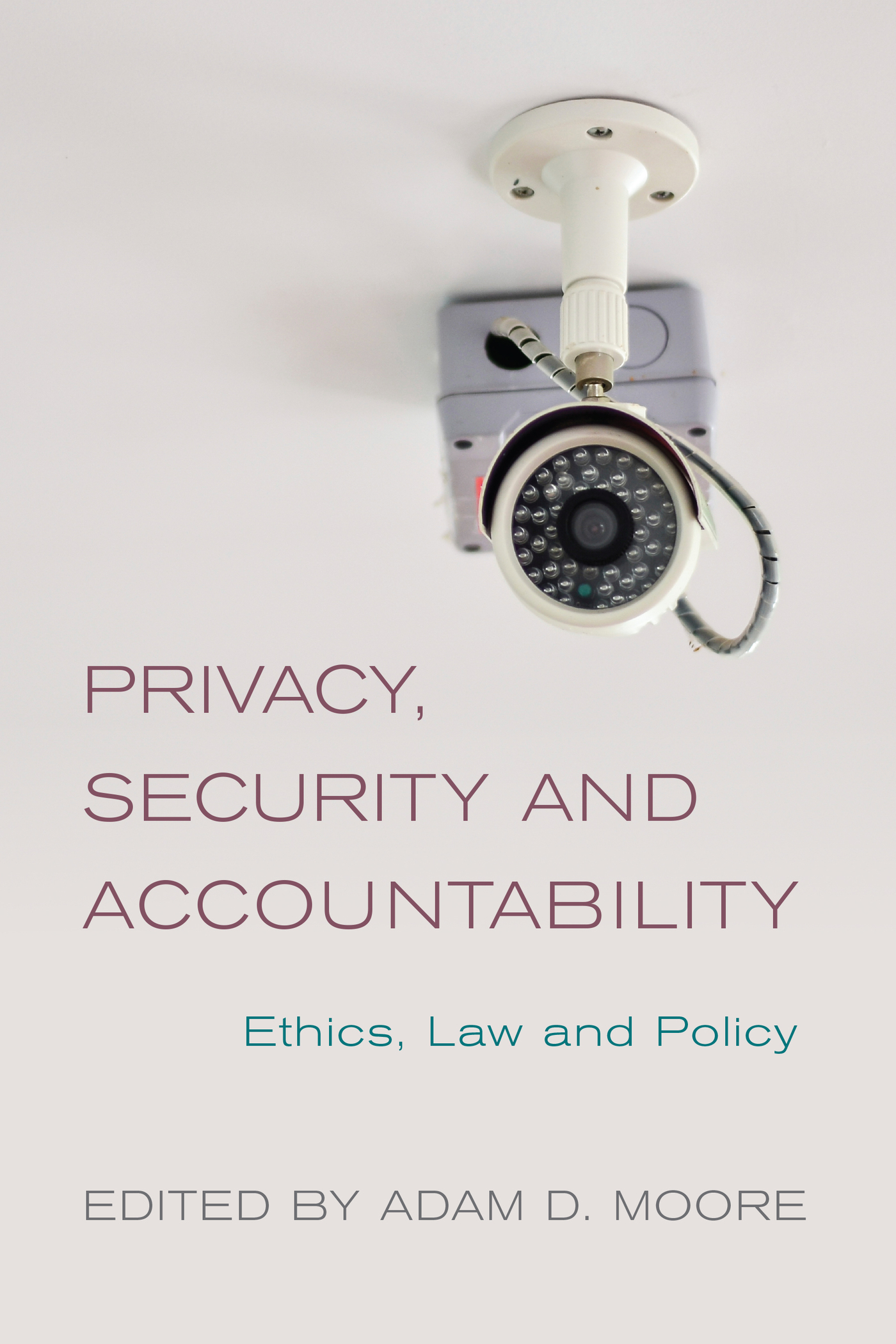
I want to thank Katie Mayer for editing the chapters, as well as the Information School at the University of Washington for providing research assistant support. Katies hard work and perseverance have been invaluable. I also want to thank Sarah Campbell, Sinead Murphy and the other editors at Rowman & Littlefield International for all their help in preparing and editing the manuscript. Acknowledgements and thanks go to Michael Katell for reading and commenting on all of the articles.
Several of the chapters published in this volume were originally presented at the Information Ethics Roundtable: Information Ethics and Policy: Intellectual Property, Privacy, and Freedom of Speech, University of Washington, April 2426, 2013. This conference was supported by the Walter Chapin Simpson Center for Humanities, the Department of Philosophy, the Information School and the Program on Values in Society.
Special thanks goes to my family and loved onesKimberly Moore, Alan Moore and Amy Moorefor putting up with all of the time I have spent staring at computer screens during this project.
Michael Katell and Adam D. Moore
The Value of Privacy, Security and Accountability
Within democratic societies, privacy, security and accountability are often seen as important values that must be balanced appropriately. If we accept or permit too much privacy, the result may be too little accountability and security. Conversely, when privacy is minimized, individuals may be constrained and denied the space to grow, experiment, and engage in practices not generally accepted by the majority. In our increasingly networked and algorithmically analyzed society, new technical capabilities are forcing a continuing reevaluation of previously accepted norms governing privacy and its tension with other values, including accountability and security.
Predictive analytics will soon be able to determine with a high degree of probability where you will be next week and what you might be doing. Facial-recognition technology, heat-sensing cameras, license-plate readers, and data mining will soon enable police to engage in what has been called virtual frisking. Moreover, the reidentification of anonymized data sets is promising to make public the most private areas of our lives by exposing information we believed to be protected and unavailable for use by marketers, hiring managers, or government actors.
Against the ever-growing apparatus of technology-based surveillance are those who champion privacy and direct technical talent and resources towards its enablement. Data encryption, anonymization systems like Tor, the so-called dark web, and virtual currencies such as bitcoin may provide technologically based privacy protections. Aside from technical approaches, a diverse collection of authors and scholars is ushering in a cogent articulation and defense of privacy. Moreover, there is a growing interdisciplinary movement within the European Union, the United States and Canada to legislatively protect privacy, while at the same time insisting on accountability for those in power. However, there is a multitude of dynamic technical, ideological, and legal issues that makes the preservation or reacquisition of informational privacy complex and politically fraught.
In bringing together leading scholars to address the tensions between privacy, security, and accountability, this anthology is intended to address the thorny value propositions of an increasingly interconnected and monitored society. Our hope is that by clarifying the moral, legal, and social foundations of privacy, security, and accountability, we can move towards determining the appropriate balance between these contested values. Advances in information technology development have introduced concerns and considerations that simply werent on the minds of most people as little as twenty years ago. The capabilities, opportunities, and anxieties being articulated by the authors in this collection are novel, ethically complex, and badly in need of sustained inquiry. We begin by providing an overview of the values under study.
Privacy has been defined in many ways over the last century. This brief summary indicates the variety and breadth of the definitions that have been offered.
In addition to the different conceptions already noted, there are two distinctions that have been widely discussed related to defining privacy. The first is the distinction between descriptive and normative conceptions of privacy. A descriptive or nonnormative account describes a state or condition where privacy obtains. An example would be W. A. Parents definition: Privacy is the condition of not having undocumented personal knowledge about one possessed by others. A normative account, on the other hand, makes references to moral obligations or claims. For example, when DeCew talks about what is of legitimate concern of others, she includes ethical considerations. Similarly, Allens conception of privacy as an obligation to others is based in a normative moral theory.
Reductionist and nonreductionist accounts of privacy have also been offered. Unlike Davis, the nonreductionist views privacy as related to, but distinct from, other rights or concepts.
It is our view that these distinctions are not as important as some have thought. First, while it is important not to confuse normative and descriptive accounts of privacy, it is possible and proper to define privacy along both dimensions. Intellectual property is also defined descriptively and normatively. We may, for example, define intellectual property without making any essential references to normative claims. We can even give a description of the conditions that surround an intellectual property right. Moreover, we can define intellectual property in normative terms by indicating the moral claims that surround persons and their property. The same is true of privacy.
Next pageFont size:
Interval:
Bookmark:
Similar books «Privacy, Security and Accountability: Ethics, Law and Policy»
Look at similar books to Privacy, Security and Accountability: Ethics, Law and Policy. We have selected literature similar in name and meaning in the hope of providing readers with more options to find new, interesting, not yet read works.
Discussion, reviews of the book Privacy, Security and Accountability: Ethics, Law and Policy and just readers' own opinions. Leave your comments, write what you think about the work, its meaning or the main characters. Specify what exactly you liked and what you didn't like, and why you think so.

